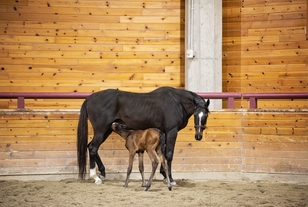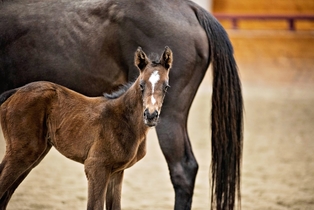
CROOKSTON, Minn. - The Minnesota Thoroughbred industry foals out between 150-200 foals each year across the state of Minnesota. These foals become a part of an industry that brings $409 million in economic impact to the State of Minnesota, per a 2017 University of Minnesota economic impact report.


“We are foaling out 10 mares this year, three of those mares are Quarter Horses and the other seven are Thoroughbreds,” said Morgan Pyles, Equine Lecturer. “When students at the University of Crookston participate in the foaling out of a Minnesota registered Thoroughbred racehorse, they not only have a valuable equine in their care, they also have the future hopes and dreams of Thoroughbred racehorse owners and breeders in their hands,” said Joe Scurto, Executive Director at Minnesota Racehorse Engagement Project.
The opportunities in the Thoroughbred industry includes but does exclude employment in reproduction, nutrition, track management and the racing industry encompasses all of that and then some for graduates in UMN Crookston’s criminal justice, horticulture, turfgrass and landscape degrees. “All of those things happen at a racetrack and relationships with the racing industry, while highly regulated, has much to offer our graduates,” said Jonathon Holland. Holland, ’95 alumni, who now works in Enrollment Management, has a degree in equine science and is a former instructor and extension educator. Holland and his two colleagues, Nicky Overgaard, Equine Lecturer and Christy Doyea, Barn Manager collaborate often to identify ways to engage students in the work that they love. “Spend the time and effort to take advantage of the opportunities and learn from the instructors,” Holland says.
“All registered Minnesota bred Thoroughbreds must be born in the state and their mares must arrive no later than March 15th each year,” said Scurto. These broodmares come from a wide array of backgrounds, Scurto went on to say some broodmares have had successful racing careers themselves and some have royal bloodlines but have never competed on the racetrack. Holland said the foaling service is competitive and affordable. “UMN Crookston maintains the service by being competitive with other facilities that have foaling services. Crookston’s faculty use this opportunity as a teaching and learning experience, at $350.00 per foal, we desire to provide the best service to our clients while engaging students in real life training,” said Nicky Overgaard, Instructor, Equine Science.
Morgan Pyles, Equine Lecturer will transition to an Assistant Professor in August. She recently joined the Crookston campus and will complete her Ph.D. from the University of Kentucky in May. “UMN Crookston’s equine program offers a range of equine science and equitation courses. I am teaching a variety of equine classes, including equine exercise physiology, reproduction, horse production and western equitation. “Watching foals grow and develop is very satisfying to me, most of my research has been with mares and foals, and let me tell you, I have gained a lot of respect for these broodmares,” she said.
According to the Minnesota Racehorse Engagement Project, owners of Thoroughbred broodmares typically receive 10% of the earnings of their progeny. “In a typical year, a Minnesota broodmare can receive a few hundred to over $10,000 per foal they produced,” said Scurto. A successful broodmare that produces 5-7 successful racehorses can provide an annuity to their owners of more than $30,000 per year.
The ten mares foaling out include four thoroughbreds from South Dakota, six from North Dakota with three thoroughbreds and three quarter horses. Staff say Crookston’s campus location is best positioned for breeders from Canada, North Dakota, and South Dakota. “To have mares foal in Minnesota and be qualified for Minnesota bred purses is great for the industry and our students,” said Holland.
Each year these Minnesota foaled and registered Thoroughbreds win over $5 million dollars for their owners racing at Canterbury Park. Many of these horses go on to compete nationally including Minnesota favorite, Mr. Jägermeister, a six-year-old who has won 11 races and accumulated over $600,000 in earnings to date.
Minnesota registered broodmares have been paired with local successful Minnesota sires like Kela, as well as world-renowned champion sires across the country. There currently is a three-year-old Minnesota foaled colt, Sota King, whose sire was the great triple crown winner American Pharaoh. Owners typically pay between $5,000- $100,000 in stud fees for their broodmares to find the right recipe for success to breed a future champion.
Scurto said the beginning moments of a racehorse’s life can make all the difference in their success on the racetrack. As the relationship continues to expand between the University of Minnesota Crookston’s Equine programs and the Minnesota horse racing industry, the larger impact students will have on this vital economic and agricultural industry.


